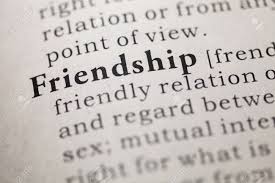By Tracie Fritcher Johnson
I recently saw a Facebook post which informed me an acquaintance was tidying up her list of friends. If I wanted to remain on it, I needed to leave her a comment saying so. It seemed as if our friendship was conditional.
What constitutes as friendship, anyway? After all, what concept has changed more dramatically in recent decades? The idea of friendship has morphed over the years from personal relationships to social connectedness. In today’s society, the latter prevails more than the first and this current generation itches for relationship it doesn’t even know it’s missing.
Are you connected to more people today than ever before, but really less connected? In the last few years, social media has become the rage. People use Facebook and Twitter to connect to childhood friends, find college acquaintances, and meet new people. Even prior to these avenues, people have been using emails and texting to communicate. It seems the days of sitting down to meaningful and unrushed conversations are almost past. Unfortunately, despite the fact that we are sharing lots of information, research reveals that we are really not connecting with those we connect with. The information we share tends to be insignificant and superficial.
In addition to presenting a false sense of connectedness, these social avenues allow us to ‘edit’ our lives and present the life we deem acceptable. Many people use these means to present a happy front and a false image of who they really are. The ability to edit out the pieces of our lives that seem unpleasant tempts us to present a picture-perfect image.
I must confess I’ve developed some time-tested friendships through the streams of social media. However, odd things happen when I allow the virtual kind to replace the life-to-life variety. A profound sense of loneliness follows me around and I just can’t shake it off. God didn’t design us for virtual connectedness. He designed us for relationships. His purpose for our lives includes godly friendships that encourage us to grow in Christ, spur us toward good deeds, and challenge us to stay the course.
Relationships of this kind run deeper than an occasional visit
to your friend’s Facebook wall to check in and say ‘hi.’ These relationships are birthed in meaningful conversation where you share your heart with a willingness to be vulnerable. In fact, nothing develops friendship and true connectedness more than face-to-face conversations. When you sit across the table from a friend you have the opportunity to watch and listen and what is said takes on additional meaning. You read joy, doubt, or confusion on his or her face so you are intentional in asking questions and sharing words of encouragement. You are able to share a needed prayer along with Godly wisdom. In turn, your friend does the same for you.
Being intentional in spending face-to-face time with a godly friend will result in a deeper relationship that facilitates spiritual growth. The book of Acts reveals the New Testament Church was intentional in cultivating godly friendships. Acts 2:46 reads “And they, continuing daily with one accord in the temple, and breaking bread from house to house, did eat their meat with gladness and singleness of heart.”
Take time today to evaluate your relationships. Are you connected with many, but not truly invested in one or two close relationships? If your answer suggests you could benefit from investing in a godly friendship, God holds the solution. Ask Him for a faithful friend. He will supply. After you pray, be open to the person God will send. Although the person will undoubtedly grow to be a great friend, God might send someone who isn’t a good friend yet. Trust His judgment. He knows what you need and He sees the person who will best challenge you and provide for you in friendship.



